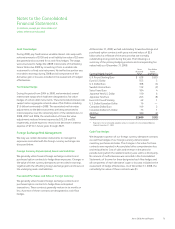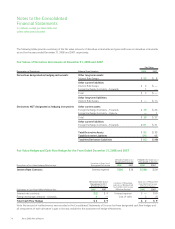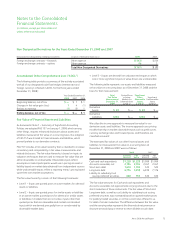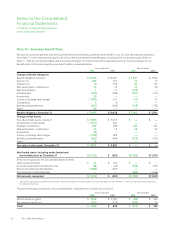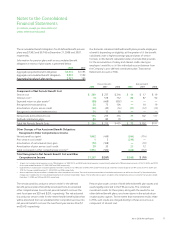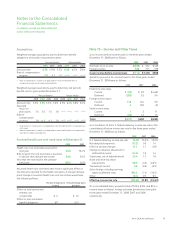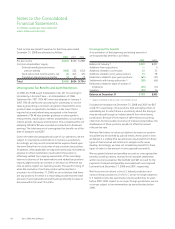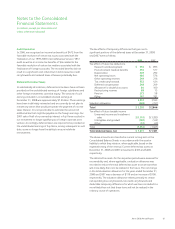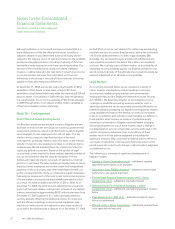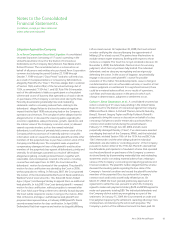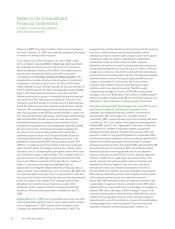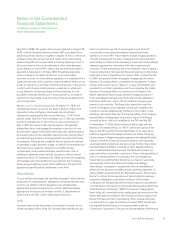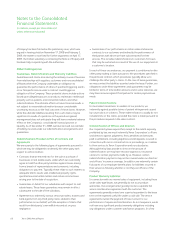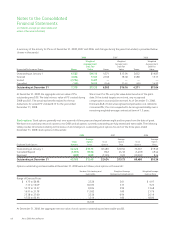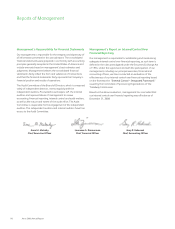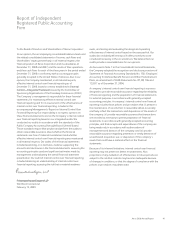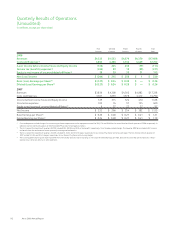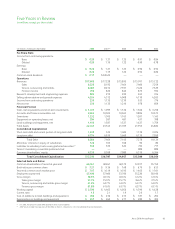Xerox 2008 Annual Report Download - page 85
Download and view the complete annual report
Please find page 85 of the 2008 Xerox annual report below. You can navigate through the pages in the report by either clicking on the pages listed below, or by using the keyword search tool below to find specific information within the annual report.
•
•
•
•
•
•
Notes to the Consolidated
Financial Statements
(in millions, except per share data and
unless otherwise indicated)
Litigation Against the Company
In re Xerox Corporation Securities Litigation: A consolidated
securities law action (consisting of 17 cases) is pending in the
United States District Court for the District of Connecticut.
Defendants are the Company, Barry Romeril, Paul Allaire and G.
Richard Thoman. The consolidated action is a class action on
behalf of all persons and entities who purchased Xerox Corporation
common stock during the period October 22, 1998 through
October 7, 1999 inclusive (“Class Period”) and who suffered a loss
as a result of misrepresentations or omissions by Defendants as
alleged by Plaintiffs (the “Class”). The Class alleges that in violation
of Section 10(b) and/or 20(a) of the Securities Exchange Act of
1934, as amended (“1934 Act”), and SEC Rule 10b-5 thereunder,
each of the defendants is liable as a participant in a fraudulent
scheme and course of business that operated as a fraud or deceit
on purchasers of the Company’s common stock during the Class
Period by disseminating materially false and misleading
statements and/or concealing material facts relating to the
defendants’ alleged failure to disclose the material negative
impact that the April 1998 restructuring had on the Company’s
operations and revenues. The complaint further alleges that the
alleged scheme: (i) deceived the investing public regarding the
economic capabilities, sales proficiencies, growth, operations and
the intrinsic value of the Company’s common stock; (ii) allowed
several corporate insiders, such as the named individual
defendants, to sell shares of privately held common stock of the
Company while in possession of materially adverse, non-public
information; and (iii) caused the individual plaintiffs and the other
members of the purported class to purchase common stock of the
Company at inflated prices. The complaint seeks unspecified
compensatory damages in favor of the plaintiffs and the other
members of the purported class against all defendants, jointly and
severally, for all damages sustained as a result of defendants’
alleged wrongdoing, including interest thereon, together with
reasonable costs and expenses incurred in the action, including
counsel fees and expert fees. In 2001, the Court denied the
defendants’ motion for dismissal of the complaint. The plaintiffs’
motion for class certification was denied by the Court in 2006,
without prejudice to refiling. In February 2007, the Court granted
the motion of the International Brotherhood of Electrical Workers
Welfare Fund of Local Union No. 164, Robert W. Roten, Robert
Agius (“Agius”) and Georgia Stanley to appoint them as additional
lead plaintiffs. In July 2007, the Court denied plaintiffs’ renewed
motion for class certification, without prejudice to renewal after
the Court holds a pre-filing conference to identify factual disputes
the Court will be required to resolve in ruling on the motion. After
that conference and Agius’s withdrawal as lead plaintiff and
proposed class representative, in February 2008 plaintiffs filed a
second renewed motion for class certification. In April 2008,
Defendants filed their response and motion to disqualify Milberg
LLP as a lead counsel. On September 30, 2008, the Court entered
an order certifying the class and denying the appointment of
Milberg LLP as a lead counsel. The parties have filed motions to
exclude certain expert testimony. Briefing with respect to those
motions is complete. The Court has not yet rendered a decision. On
November 6, 2008, the defendants filed a motion for summary
judgment, which has not yet been fully briefed. The individual
defendants and we deny any wrongdoing and are vigorously
defending the action. In the course of litigation, we periodically
engage in discussions with plaintiffs’ counsel for possible
resolution of this matter. Should developments cause a change in
our determination as to an unfavorable outcome, or result in a final
adverse judgment or a settlement for a significant amount, there
could be a material adverse effect on our results of operations,
cash flows and financial position in the period in which such
change in determination, judgment or settlement occurs.
Carlson v. Xerox Corporation, et al.: A consolidated securities law
action (consisting of 21 cases) was pending in the United States
District Court for the District of Connecticut against the Company,
KPMG and Paul A. Allaire, G. Richard Thoman, Anne M. Mulcahy,
Barry D. Romeril, Gregory Tayler and Philip Fishbach. Plaintiffs
purported to bring this case as a class action on behalf of a class
consisting of all persons and/or entities who purchased Xerox
common stock and/or bonds during the period between
February 17, 1998 through June 28, 2002 and who were
purportedly damaged thereby (“Class”). Two claims were asserted:
one alleging that each of the Company, KPMG, and the individual
defendants violated Section 10(b) of the 1934 Act and SEC Rule
10b-5 thereunder; and the other alleging that the individual
defendants are also liable as “controlling persons” of the Company
pursuant to Section 20(a) of the 1934 Act. Plaintiffs claimed that
the defendants participated in a fraudulent scheme that operated
as a fraud and deceit on purchasers of the Company’s common
stock and bonds by disseminating materially false and misleading
statements and/or concealing material adverse facts relating to
various of the Company’s accounting and reporting practices and
financial condition. The plaintiffs further alleged that this scheme
deceived the investing public regarding the true state of the
Company’s financial condition and caused the plaintiffs and other
members of the purported Class to purchase the Company’s
common stock and bonds at artificially inflated prices. On
March 27, 2008, the Court granted preliminary approval of an
agreement to settle this case, pursuant to which the Company
agreed to make cash payments totaling $670 and KPMG agreed to
make cash payments totaling $80. The individual defendants and
the Company did not admit any wrongdoing as a part of the
settlement. On January 15, 2009, the Court entered an order and
final judgment approving the settlement, awarding attorneys’ fees
and expenses, and dismissing the action with prejudice. The
Company’s portion of the settlement amount has been paid. On
Xerox 2008 Annual Report 83


